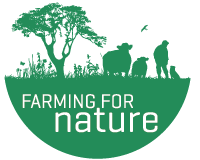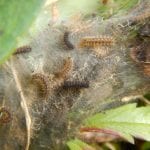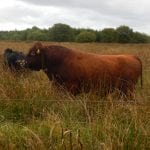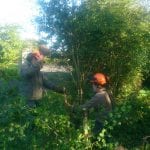Birtwistle Family
I nominate Robert, Helen, Emma, Rebecca and Annie Birtwistle for the farming for nature award because of their nature conservation work on the family farm near Battlebridge, Roscommon. The whole family have a keen interest in farming for nature and have been managing their small mixed stock organic farm with nature in mind for 23 years. They recognise their 25 hectare farm has many important high nature value habitats and do their best to balance farming with the conservation of these habitats.
The farm supports a rich diversity of flowers, trees, lichens, mosses and ferns, grasses and sedges, insects, reptiles, birds and mammals. Farming is undertaken with this in mind. They are delighted to be custodians of these habitats and take this responsibility seriously.
A large proportion of the farm is a proposed NHA and this provides habitat for Greenland White-fronted Geese, Whooper Swans, Waterfowl, Curlew, Woodcock, Snipe, Jacksnipe, Lapwing, Red Shank, Hen Harrier, Otters, bats and many other species. The farm was not included in the GLAS Plus due to a clerical error but despite this, they still manage the site for the wader birds.
Careful management of the wetland and its peripheral habitats maintains rich biodiversity and allows the Snipe, Curlew, Lapwing, and Water rail to breed in the summer whilst supporting the migratory summer visiting birds and native nesting birds such as the Grasshopper Warbler, Sedge warbler, Willow warbler, Cuckoo, Swallow, Swift, House martin, White throat, Blackcap, Stonechat, Reed bunting,and other farmland birds. This rich biodiversity supports a range of birds of prey such as Hen Harrier, Kestrel, Merlin, Sparrow Hawk, Buzzard and Long Eared Owl. With birds of prey and others in mind the farm is a rodenticide free zone.
The farm has been managed under organic principles for over two decades, no fertilisers, pesticides or herbicides have been used in this time. Animal husbandry is of priority but the use of antihelminthics is kept to a minimum, herbal anti parasitic treatments are used along with grazing management plans as herd strength and natural resistance are being established. The organic management plan benefits the whole farm, the absence of conventional farming chemicals is building healthier soils and microfauna to support a healthier ecosystem, crops, animals and biodiversity.
Conservation grazing with Dexter cattle and horses has led to an increase in many wild flowers. Expansion of Marsh Fritillary Butterfly caterpillar colonies is seen as a great success.
Hedgerow management is an important part of the farm biodiversity plan. A hazel coppice has been planted to support on farm hedge laying and hedgerow management.
Insects are encouraged in bug hotels; bee boxes and beetle banks and farm work always takes into consideration hibernating creatures.
The impact of the whole household is kept to a minimum, only frog friendly organic soaps are used. Dogs and cats are kenneled and walked during the breeding season to reduce their impact.
Rare Fen violet is believed to occur within the NHA inundation zone, if so, it’s a 1st record for Co. Roscommon.
Nominator: John Matthews, Conservation Ranger, NPWS



